NHS Research Portfolio: Leadership, Training, Talent Management Impact
VerifiedAdded on 2023/06/15
|9
|2683
|169
Portfolio
AI Summary
This portfolio provides an analysis of leadership and management, training and development, and talent management within the NHS (National Health Service). It covers the concepts, operational contexts, and theoretical models related to these areas. The discussion emphasizes the importance of transformational leadership, social learning theory, and strategic talent management in enhancing organizational performance and patient care within the NHS. Recommendations are provided for improving leadership development, training effectiveness, and talent retention strategies. The portfolio concludes that effective management practices are crucial for the NHS to maintain productivity and a positive image.

Individual research
portfolio about NHS
portfolio about NHS
Paraphrase This Document
Need a fresh take? Get an instant paraphrase of this document with our AI Paraphraser
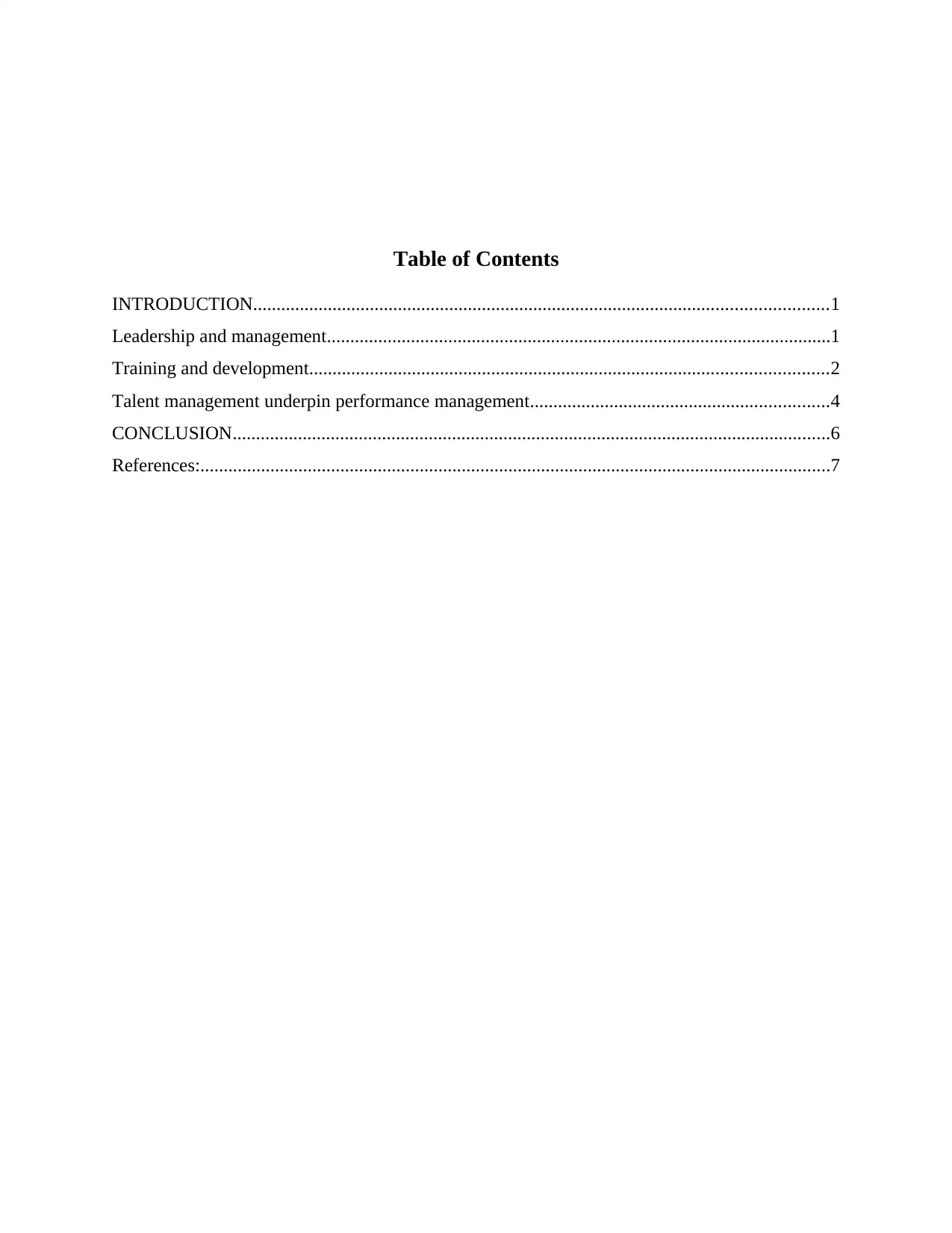
Table of Contents
INTRODUCTION...........................................................................................................................1
Leadership and management............................................................................................................1
Training and development...............................................................................................................2
Talent management underpin performance management................................................................4
CONCLUSION................................................................................................................................6
References:.......................................................................................................................................7
INTRODUCTION...........................................................................................................................1
Leadership and management............................................................................................................1
Training and development...............................................................................................................2
Talent management underpin performance management................................................................4
CONCLUSION................................................................................................................................6
References:.......................................................................................................................................7
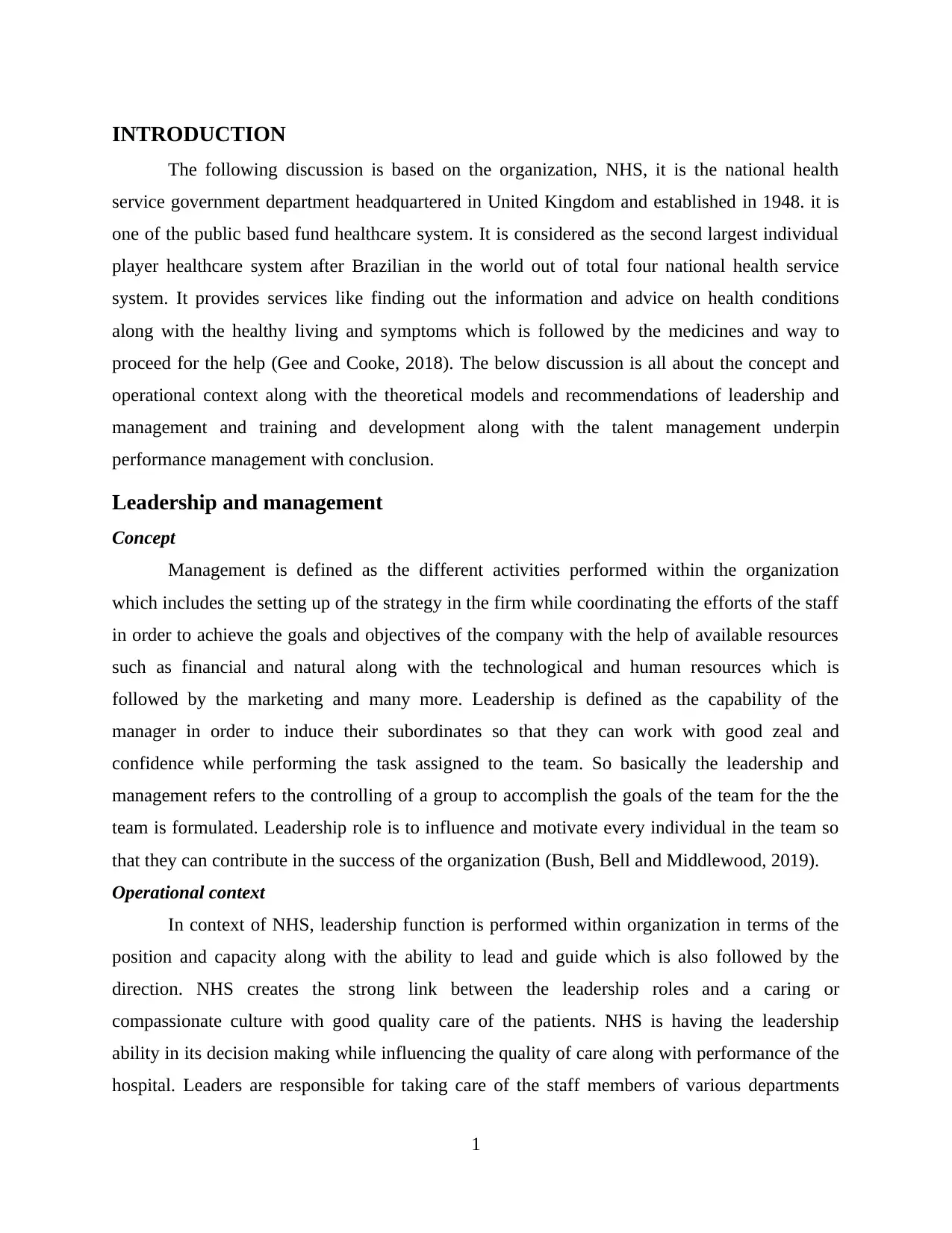
INTRODUCTION
The following discussion is based on the organization, NHS, it is the national health
service government department headquartered in United Kingdom and established in 1948. it is
one of the public based fund healthcare system. It is considered as the second largest individual
player healthcare system after Brazilian in the world out of total four national health service
system. It provides services like finding out the information and advice on health conditions
along with the healthy living and symptoms which is followed by the medicines and way to
proceed for the help (Gee and Cooke, 2018). The below discussion is all about the concept and
operational context along with the theoretical models and recommendations of leadership and
management and training and development along with the talent management underpin
performance management with conclusion.
Leadership and management
Concept
Management is defined as the different activities performed within the organization
which includes the setting up of the strategy in the firm while coordinating the efforts of the staff
in order to achieve the goals and objectives of the company with the help of available resources
such as financial and natural along with the technological and human resources which is
followed by the marketing and many more. Leadership is defined as the capability of the
manager in order to induce their subordinates so that they can work with good zeal and
confidence while performing the task assigned to the team. So basically the leadership and
management refers to the controlling of a group to accomplish the goals of the team for the the
team is formulated. Leadership role is to influence and motivate every individual in the team so
that they can contribute in the success of the organization (Bush, Bell and Middlewood, 2019).
Operational context
In context of NHS, leadership function is performed within organization in terms of the
position and capacity along with the ability to lead and guide which is also followed by the
direction. NHS creates the strong link between the leadership roles and a caring or
compassionate culture with good quality care of the patients. NHS is having the leadership
ability in its decision making while influencing the quality of care along with performance of the
hospital. Leaders are responsible for taking care of the staff members of various departments
1
The following discussion is based on the organization, NHS, it is the national health
service government department headquartered in United Kingdom and established in 1948. it is
one of the public based fund healthcare system. It is considered as the second largest individual
player healthcare system after Brazilian in the world out of total four national health service
system. It provides services like finding out the information and advice on health conditions
along with the healthy living and symptoms which is followed by the medicines and way to
proceed for the help (Gee and Cooke, 2018). The below discussion is all about the concept and
operational context along with the theoretical models and recommendations of leadership and
management and training and development along with the talent management underpin
performance management with conclusion.
Leadership and management
Concept
Management is defined as the different activities performed within the organization
which includes the setting up of the strategy in the firm while coordinating the efforts of the staff
in order to achieve the goals and objectives of the company with the help of available resources
such as financial and natural along with the technological and human resources which is
followed by the marketing and many more. Leadership is defined as the capability of the
manager in order to induce their subordinates so that they can work with good zeal and
confidence while performing the task assigned to the team. So basically the leadership and
management refers to the controlling of a group to accomplish the goals of the team for the the
team is formulated. Leadership role is to influence and motivate every individual in the team so
that they can contribute in the success of the organization (Bush, Bell and Middlewood, 2019).
Operational context
In context of NHS, leadership function is performed within organization in terms of the
position and capacity along with the ability to lead and guide which is also followed by the
direction. NHS creates the strong link between the leadership roles and a caring or
compassionate culture with good quality care of the patients. NHS is having the leadership
ability in its decision making while influencing the quality of care along with performance of the
hospital. Leaders are responsible for taking care of the staff members of various departments
1
⊘ This is a preview!⊘
Do you want full access?
Subscribe today to unlock all pages.

Trusted by 1+ million students worldwide
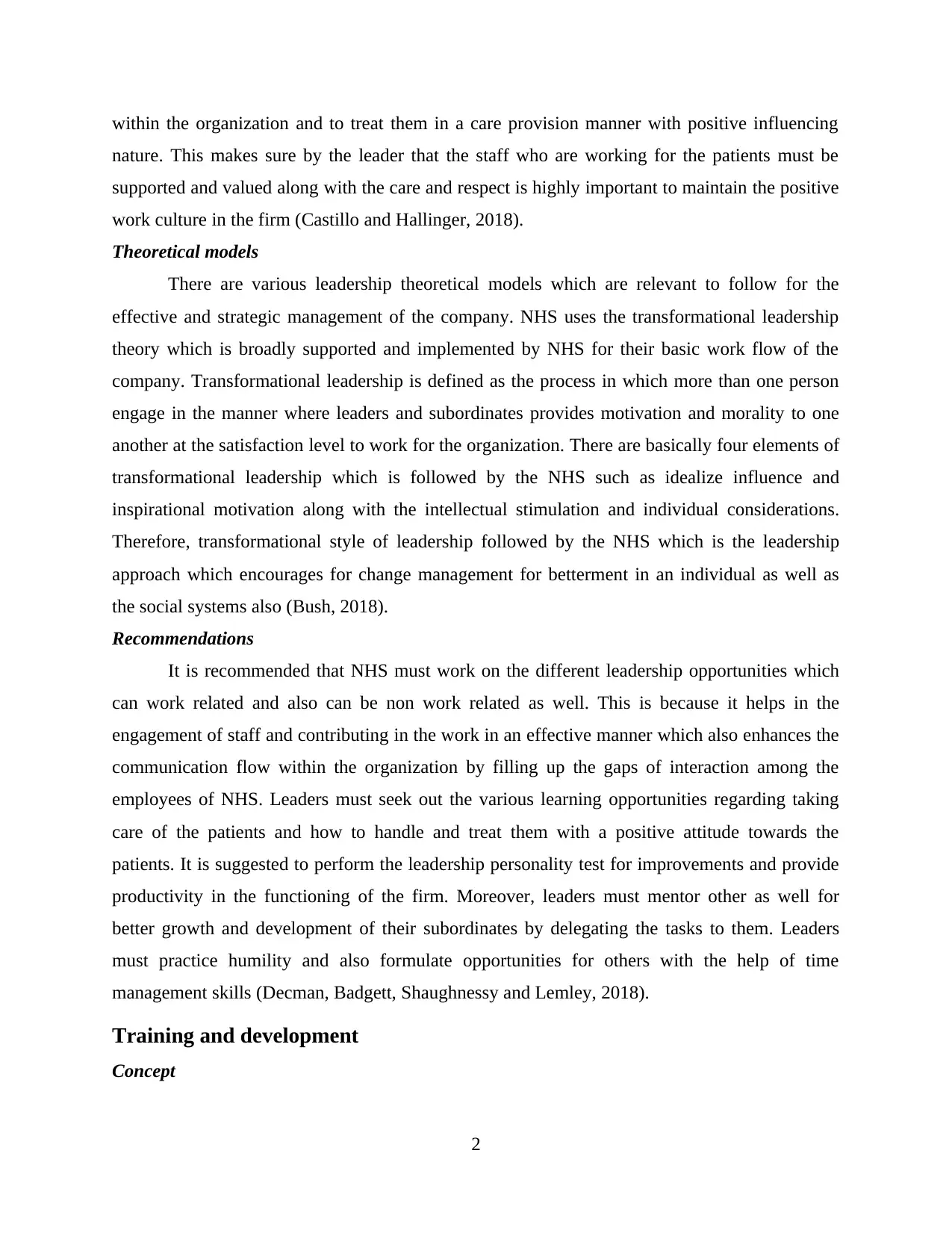
within the organization and to treat them in a care provision manner with positive influencing
nature. This makes sure by the leader that the staff who are working for the patients must be
supported and valued along with the care and respect is highly important to maintain the positive
work culture in the firm (Castillo and Hallinger, 2018).
Theoretical models
There are various leadership theoretical models which are relevant to follow for the
effective and strategic management of the company. NHS uses the transformational leadership
theory which is broadly supported and implemented by NHS for their basic work flow of the
company. Transformational leadership is defined as the process in which more than one person
engage in the manner where leaders and subordinates provides motivation and morality to one
another at the satisfaction level to work for the organization. There are basically four elements of
transformational leadership which is followed by the NHS such as idealize influence and
inspirational motivation along with the intellectual stimulation and individual considerations.
Therefore, transformational style of leadership followed by the NHS which is the leadership
approach which encourages for change management for betterment in an individual as well as
the social systems also (Bush, 2018).
Recommendations
It is recommended that NHS must work on the different leadership opportunities which
can work related and also can be non work related as well. This is because it helps in the
engagement of staff and contributing in the work in an effective manner which also enhances the
communication flow within the organization by filling up the gaps of interaction among the
employees of NHS. Leaders must seek out the various learning opportunities regarding taking
care of the patients and how to handle and treat them with a positive attitude towards the
patients. It is suggested to perform the leadership personality test for improvements and provide
productivity in the functioning of the firm. Moreover, leaders must mentor other as well for
better growth and development of their subordinates by delegating the tasks to them. Leaders
must practice humility and also formulate opportunities for others with the help of time
management skills (Decman, Badgett, Shaughnessy and Lemley, 2018).
Training and development
Concept
2
nature. This makes sure by the leader that the staff who are working for the patients must be
supported and valued along with the care and respect is highly important to maintain the positive
work culture in the firm (Castillo and Hallinger, 2018).
Theoretical models
There are various leadership theoretical models which are relevant to follow for the
effective and strategic management of the company. NHS uses the transformational leadership
theory which is broadly supported and implemented by NHS for their basic work flow of the
company. Transformational leadership is defined as the process in which more than one person
engage in the manner where leaders and subordinates provides motivation and morality to one
another at the satisfaction level to work for the organization. There are basically four elements of
transformational leadership which is followed by the NHS such as idealize influence and
inspirational motivation along with the intellectual stimulation and individual considerations.
Therefore, transformational style of leadership followed by the NHS which is the leadership
approach which encourages for change management for betterment in an individual as well as
the social systems also (Bush, 2018).
Recommendations
It is recommended that NHS must work on the different leadership opportunities which
can work related and also can be non work related as well. This is because it helps in the
engagement of staff and contributing in the work in an effective manner which also enhances the
communication flow within the organization by filling up the gaps of interaction among the
employees of NHS. Leaders must seek out the various learning opportunities regarding taking
care of the patients and how to handle and treat them with a positive attitude towards the
patients. It is suggested to perform the leadership personality test for improvements and provide
productivity in the functioning of the firm. Moreover, leaders must mentor other as well for
better growth and development of their subordinates by delegating the tasks to them. Leaders
must practice humility and also formulate opportunities for others with the help of time
management skills (Decman, Badgett, Shaughnessy and Lemley, 2018).
Training and development
Concept
2
Paraphrase This Document
Need a fresh take? Get an instant paraphrase of this document with our AI Paraphraser
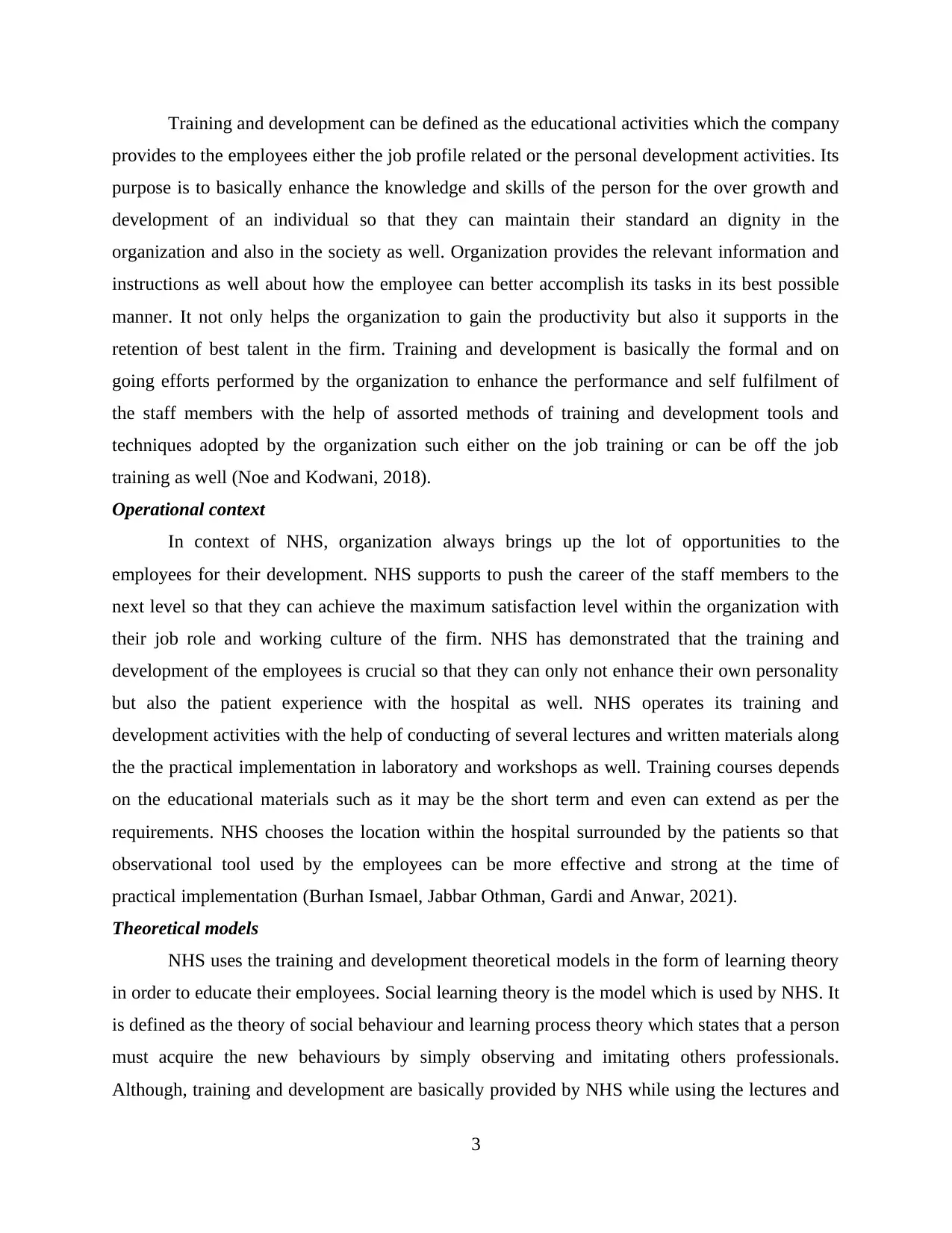
Training and development can be defined as the educational activities which the company
provides to the employees either the job profile related or the personal development activities. Its
purpose is to basically enhance the knowledge and skills of the person for the over growth and
development of an individual so that they can maintain their standard an dignity in the
organization and also in the society as well. Organization provides the relevant information and
instructions as well about how the employee can better accomplish its tasks in its best possible
manner. It not only helps the organization to gain the productivity but also it supports in the
retention of best talent in the firm. Training and development is basically the formal and on
going efforts performed by the organization to enhance the performance and self fulfilment of
the staff members with the help of assorted methods of training and development tools and
techniques adopted by the organization such either on the job training or can be off the job
training as well (Noe and Kodwani, 2018).
Operational context
In context of NHS, organization always brings up the lot of opportunities to the
employees for their development. NHS supports to push the career of the staff members to the
next level so that they can achieve the maximum satisfaction level within the organization with
their job role and working culture of the firm. NHS has demonstrated that the training and
development of the employees is crucial so that they can only not enhance their own personality
but also the patient experience with the hospital as well. NHS operates its training and
development activities with the help of conducting of several lectures and written materials along
the the practical implementation in laboratory and workshops as well. Training courses depends
on the educational materials such as it may be the short term and even can extend as per the
requirements. NHS chooses the location within the hospital surrounded by the patients so that
observational tool used by the employees can be more effective and strong at the time of
practical implementation (Burhan Ismael, Jabbar Othman, Gardi and Anwar, 2021).
Theoretical models
NHS uses the training and development theoretical models in the form of learning theory
in order to educate their employees. Social learning theory is the model which is used by NHS. It
is defined as the theory of social behaviour and learning process theory which states that a person
must acquire the new behaviours by simply observing and imitating others professionals.
Although, training and development are basically provided by NHS while using the lectures and
3
provides to the employees either the job profile related or the personal development activities. Its
purpose is to basically enhance the knowledge and skills of the person for the over growth and
development of an individual so that they can maintain their standard an dignity in the
organization and also in the society as well. Organization provides the relevant information and
instructions as well about how the employee can better accomplish its tasks in its best possible
manner. It not only helps the organization to gain the productivity but also it supports in the
retention of best talent in the firm. Training and development is basically the formal and on
going efforts performed by the organization to enhance the performance and self fulfilment of
the staff members with the help of assorted methods of training and development tools and
techniques adopted by the organization such either on the job training or can be off the job
training as well (Noe and Kodwani, 2018).
Operational context
In context of NHS, organization always brings up the lot of opportunities to the
employees for their development. NHS supports to push the career of the staff members to the
next level so that they can achieve the maximum satisfaction level within the organization with
their job role and working culture of the firm. NHS has demonstrated that the training and
development of the employees is crucial so that they can only not enhance their own personality
but also the patient experience with the hospital as well. NHS operates its training and
development activities with the help of conducting of several lectures and written materials along
the the practical implementation in laboratory and workshops as well. Training courses depends
on the educational materials such as it may be the short term and even can extend as per the
requirements. NHS chooses the location within the hospital surrounded by the patients so that
observational tool used by the employees can be more effective and strong at the time of
practical implementation (Burhan Ismael, Jabbar Othman, Gardi and Anwar, 2021).
Theoretical models
NHS uses the training and development theoretical models in the form of learning theory
in order to educate their employees. Social learning theory is the model which is used by NHS. It
is defined as the theory of social behaviour and learning process theory which states that a person
must acquire the new behaviours by simply observing and imitating others professionals.
Although, training and development are basically provided by NHS while using the lectures and
3
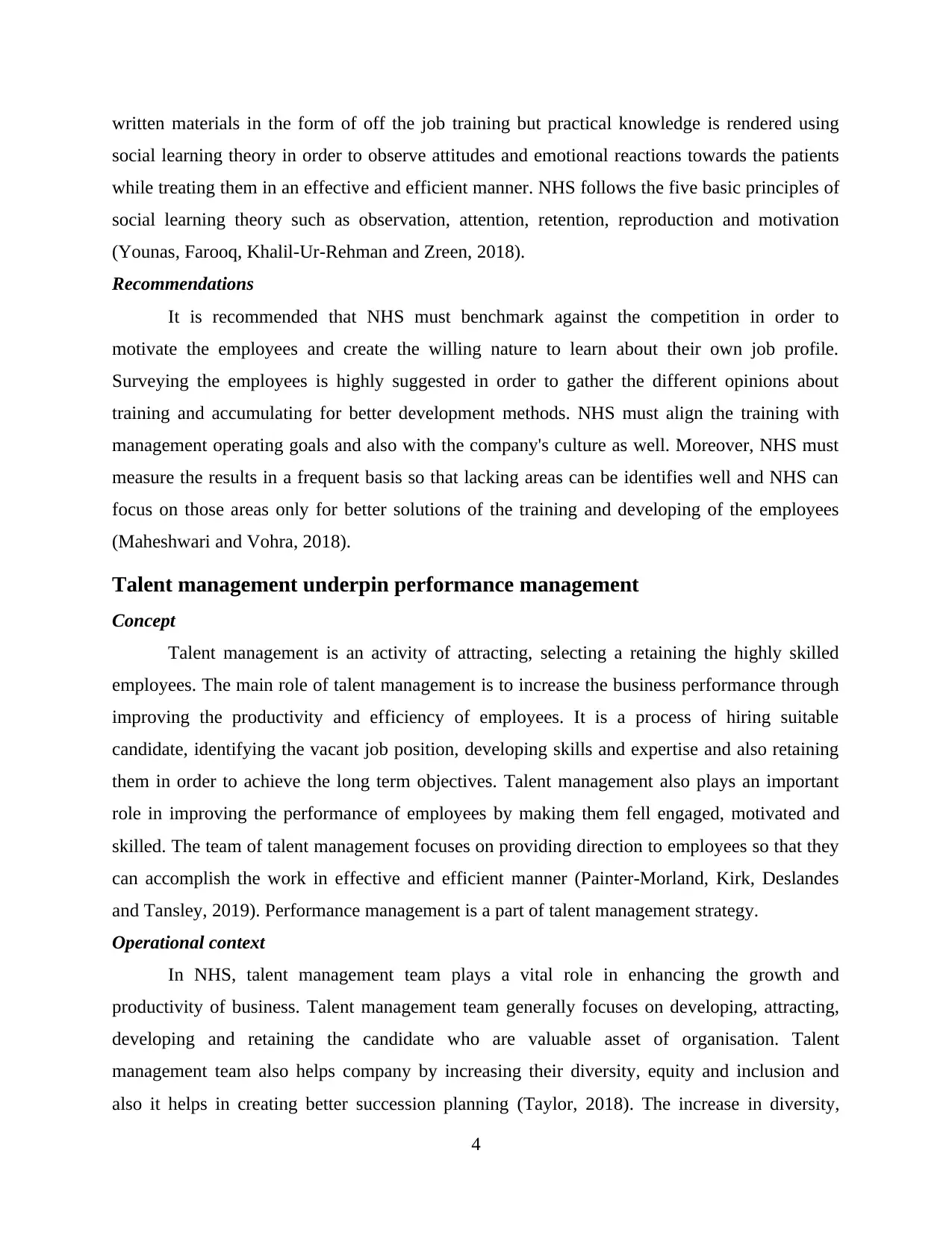
written materials in the form of off the job training but practical knowledge is rendered using
social learning theory in order to observe attitudes and emotional reactions towards the patients
while treating them in an effective and efficient manner. NHS follows the five basic principles of
social learning theory such as observation, attention, retention, reproduction and motivation
(Younas, Farooq, Khalil-Ur-Rehman and Zreen, 2018).
Recommendations
It is recommended that NHS must benchmark against the competition in order to
motivate the employees and create the willing nature to learn about their own job profile.
Surveying the employees is highly suggested in order to gather the different opinions about
training and accumulating for better development methods. NHS must align the training with
management operating goals and also with the company's culture as well. Moreover, NHS must
measure the results in a frequent basis so that lacking areas can be identifies well and NHS can
focus on those areas only for better solutions of the training and developing of the employees
(Maheshwari and Vohra, 2018).
Talent management underpin performance management
Concept
Talent management is an activity of attracting, selecting a retaining the highly skilled
employees. The main role of talent management is to increase the business performance through
improving the productivity and efficiency of employees. It is a process of hiring suitable
candidate, identifying the vacant job position, developing skills and expertise and also retaining
them in order to achieve the long term objectives. Talent management also plays an important
role in improving the performance of employees by making them fell engaged, motivated and
skilled. The team of talent management focuses on providing direction to employees so that they
can accomplish the work in effective and efficient manner (Painter‐Morland, Kirk, Deslandes
and Tansley, 2019). Performance management is a part of talent management strategy.
Operational context
In NHS, talent management team plays a vital role in enhancing the growth and
productivity of business. Talent management team generally focuses on developing, attracting,
developing and retaining the candidate who are valuable asset of organisation. Talent
management team also helps company by increasing their diversity, equity and inclusion and
also it helps in creating better succession planning (Taylor, 2018). The increase in diversity,
4
social learning theory in order to observe attitudes and emotional reactions towards the patients
while treating them in an effective and efficient manner. NHS follows the five basic principles of
social learning theory such as observation, attention, retention, reproduction and motivation
(Younas, Farooq, Khalil-Ur-Rehman and Zreen, 2018).
Recommendations
It is recommended that NHS must benchmark against the competition in order to
motivate the employees and create the willing nature to learn about their own job profile.
Surveying the employees is highly suggested in order to gather the different opinions about
training and accumulating for better development methods. NHS must align the training with
management operating goals and also with the company's culture as well. Moreover, NHS must
measure the results in a frequent basis so that lacking areas can be identifies well and NHS can
focus on those areas only for better solutions of the training and developing of the employees
(Maheshwari and Vohra, 2018).
Talent management underpin performance management
Concept
Talent management is an activity of attracting, selecting a retaining the highly skilled
employees. The main role of talent management is to increase the business performance through
improving the productivity and efficiency of employees. It is a process of hiring suitable
candidate, identifying the vacant job position, developing skills and expertise and also retaining
them in order to achieve the long term objectives. Talent management also plays an important
role in improving the performance of employees by making them fell engaged, motivated and
skilled. The team of talent management focuses on providing direction to employees so that they
can accomplish the work in effective and efficient manner (Painter‐Morland, Kirk, Deslandes
and Tansley, 2019). Performance management is a part of talent management strategy.
Operational context
In NHS, talent management team plays a vital role in enhancing the growth and
productivity of business. Talent management team generally focuses on developing, attracting,
developing and retaining the candidate who are valuable asset of organisation. Talent
management team also helps company by increasing their diversity, equity and inclusion and
also it helps in creating better succession planning (Taylor, 2018). The increase in diversity,
4
⊘ This is a preview!⊘
Do you want full access?
Subscribe today to unlock all pages.

Trusted by 1+ million students worldwide
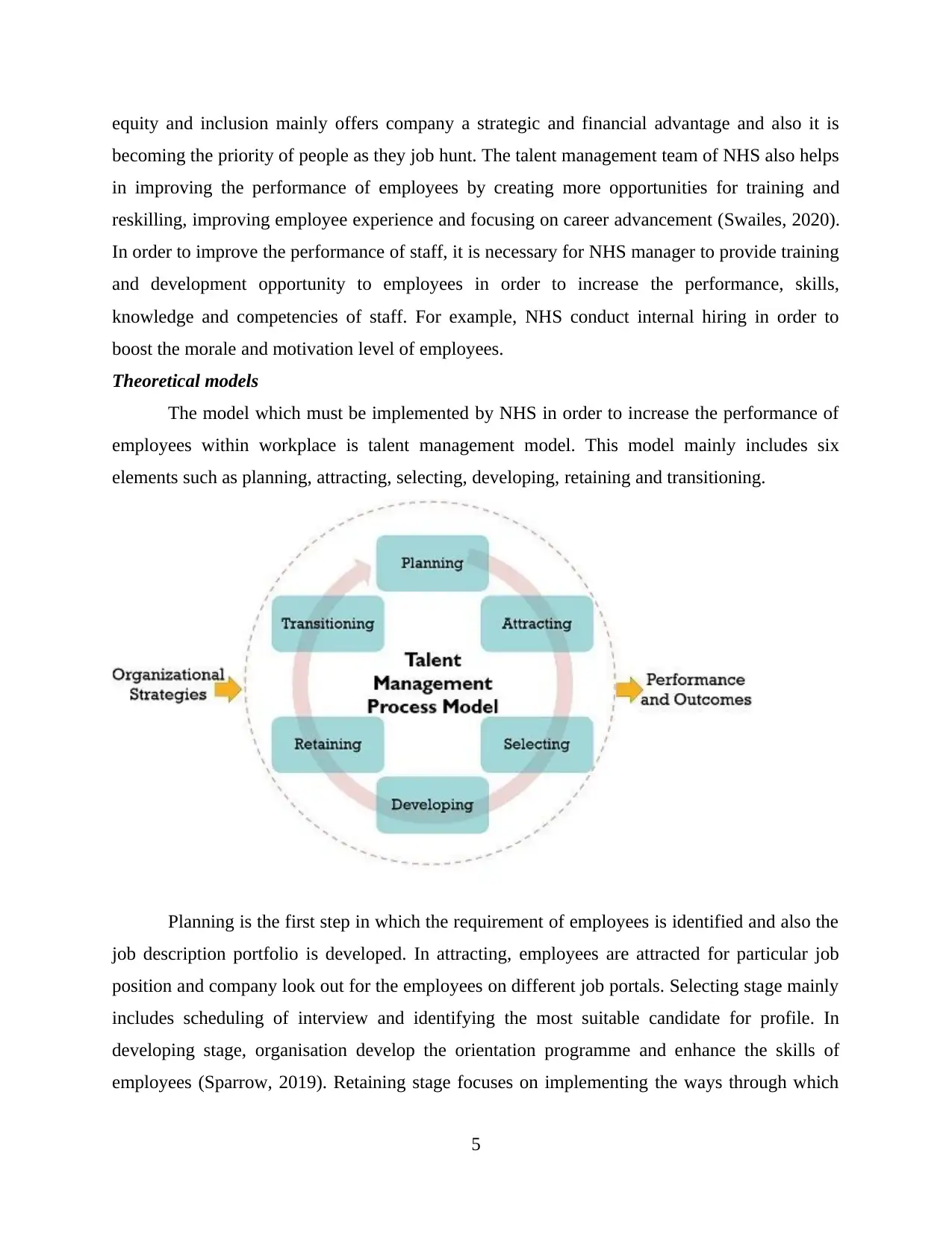
equity and inclusion mainly offers company a strategic and financial advantage and also it is
becoming the priority of people as they job hunt. The talent management team of NHS also helps
in improving the performance of employees by creating more opportunities for training and
reskilling, improving employee experience and focusing on career advancement (Swailes, 2020).
In order to improve the performance of staff, it is necessary for NHS manager to provide training
and development opportunity to employees in order to increase the performance, skills,
knowledge and competencies of staff. For example, NHS conduct internal hiring in order to
boost the morale and motivation level of employees.
Theoretical models
The model which must be implemented by NHS in order to increase the performance of
employees within workplace is talent management model. This model mainly includes six
elements such as planning, attracting, selecting, developing, retaining and transitioning.
Planning is the first step in which the requirement of employees is identified and also the
job description portfolio is developed. In attracting, employees are attracted for particular job
position and company look out for the employees on different job portals. Selecting stage mainly
includes scheduling of interview and identifying the most suitable candidate for profile. In
developing stage, organisation develop the orientation programme and enhance the skills of
employees (Sparrow, 2019). Retaining stage focuses on implementing the ways through which
5
becoming the priority of people as they job hunt. The talent management team of NHS also helps
in improving the performance of employees by creating more opportunities for training and
reskilling, improving employee experience and focusing on career advancement (Swailes, 2020).
In order to improve the performance of staff, it is necessary for NHS manager to provide training
and development opportunity to employees in order to increase the performance, skills,
knowledge and competencies of staff. For example, NHS conduct internal hiring in order to
boost the morale and motivation level of employees.
Theoretical models
The model which must be implemented by NHS in order to increase the performance of
employees within workplace is talent management model. This model mainly includes six
elements such as planning, attracting, selecting, developing, retaining and transitioning.
Planning is the first step in which the requirement of employees is identified and also the
job description portfolio is developed. In attracting, employees are attracted for particular job
position and company look out for the employees on different job portals. Selecting stage mainly
includes scheduling of interview and identifying the most suitable candidate for profile. In
developing stage, organisation develop the orientation programme and enhance the skills of
employees (Sparrow, 2019). Retaining stage focuses on implementing the ways through which
5
Paraphrase This Document
Need a fresh take? Get an instant paraphrase of this document with our AI Paraphraser
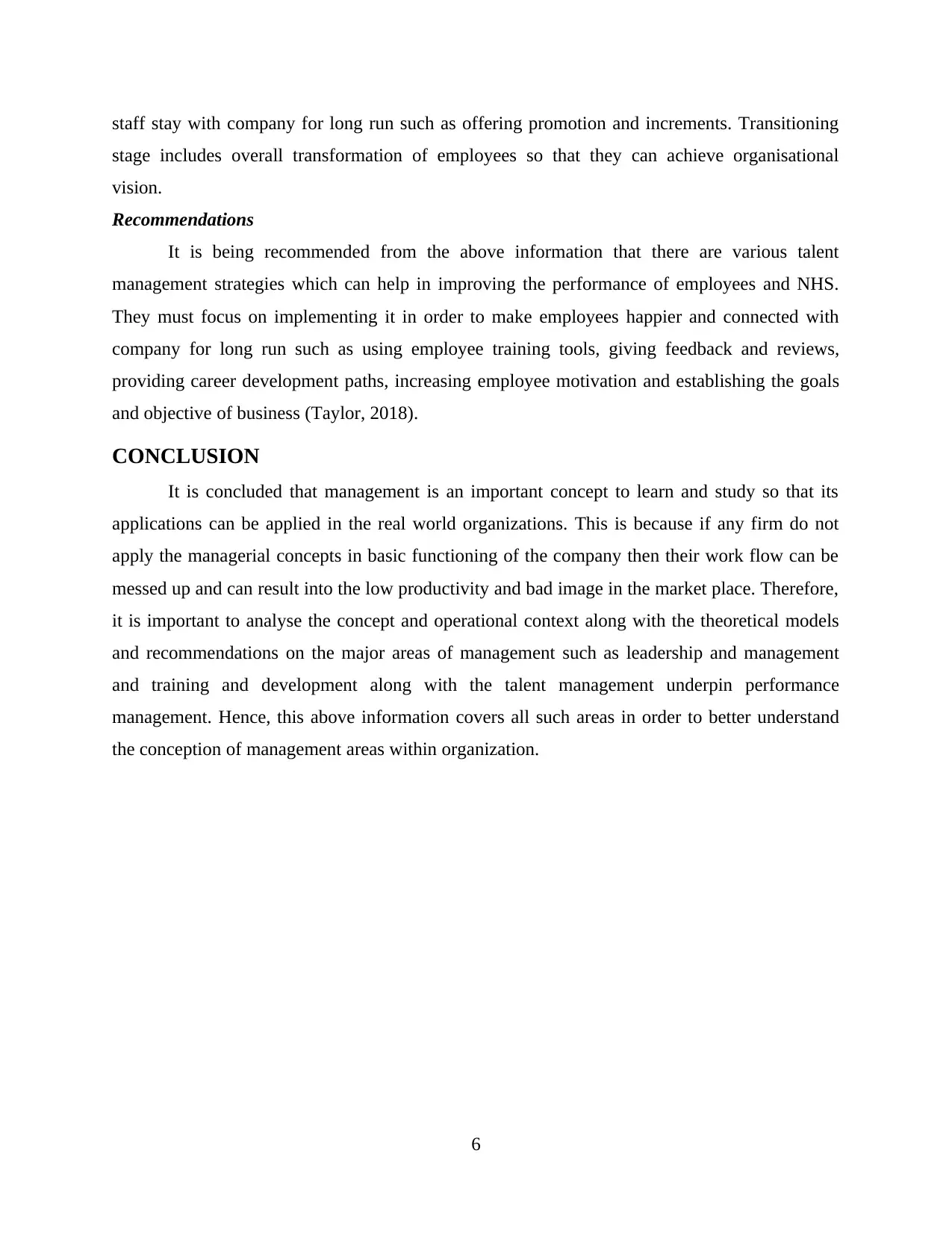
staff stay with company for long run such as offering promotion and increments. Transitioning
stage includes overall transformation of employees so that they can achieve organisational
vision.
Recommendations
It is being recommended from the above information that there are various talent
management strategies which can help in improving the performance of employees and NHS.
They must focus on implementing it in order to make employees happier and connected with
company for long run such as using employee training tools, giving feedback and reviews,
providing career development paths, increasing employee motivation and establishing the goals
and objective of business (Taylor, 2018).
CONCLUSION
It is concluded that management is an important concept to learn and study so that its
applications can be applied in the real world organizations. This is because if any firm do not
apply the managerial concepts in basic functioning of the company then their work flow can be
messed up and can result into the low productivity and bad image in the market place. Therefore,
it is important to analyse the concept and operational context along with the theoretical models
and recommendations on the major areas of management such as leadership and management
and training and development along with the talent management underpin performance
management. Hence, this above information covers all such areas in order to better understand
the conception of management areas within organization.
6
stage includes overall transformation of employees so that they can achieve organisational
vision.
Recommendations
It is being recommended from the above information that there are various talent
management strategies which can help in improving the performance of employees and NHS.
They must focus on implementing it in order to make employees happier and connected with
company for long run such as using employee training tools, giving feedback and reviews,
providing career development paths, increasing employee motivation and establishing the goals
and objective of business (Taylor, 2018).
CONCLUSION
It is concluded that management is an important concept to learn and study so that its
applications can be applied in the real world organizations. This is because if any firm do not
apply the managerial concepts in basic functioning of the company then their work flow can be
messed up and can result into the low productivity and bad image in the market place. Therefore,
it is important to analyse the concept and operational context along with the theoretical models
and recommendations on the major areas of management such as leadership and management
and training and development along with the talent management underpin performance
management. Hence, this above information covers all such areas in order to better understand
the conception of management areas within organization.
6
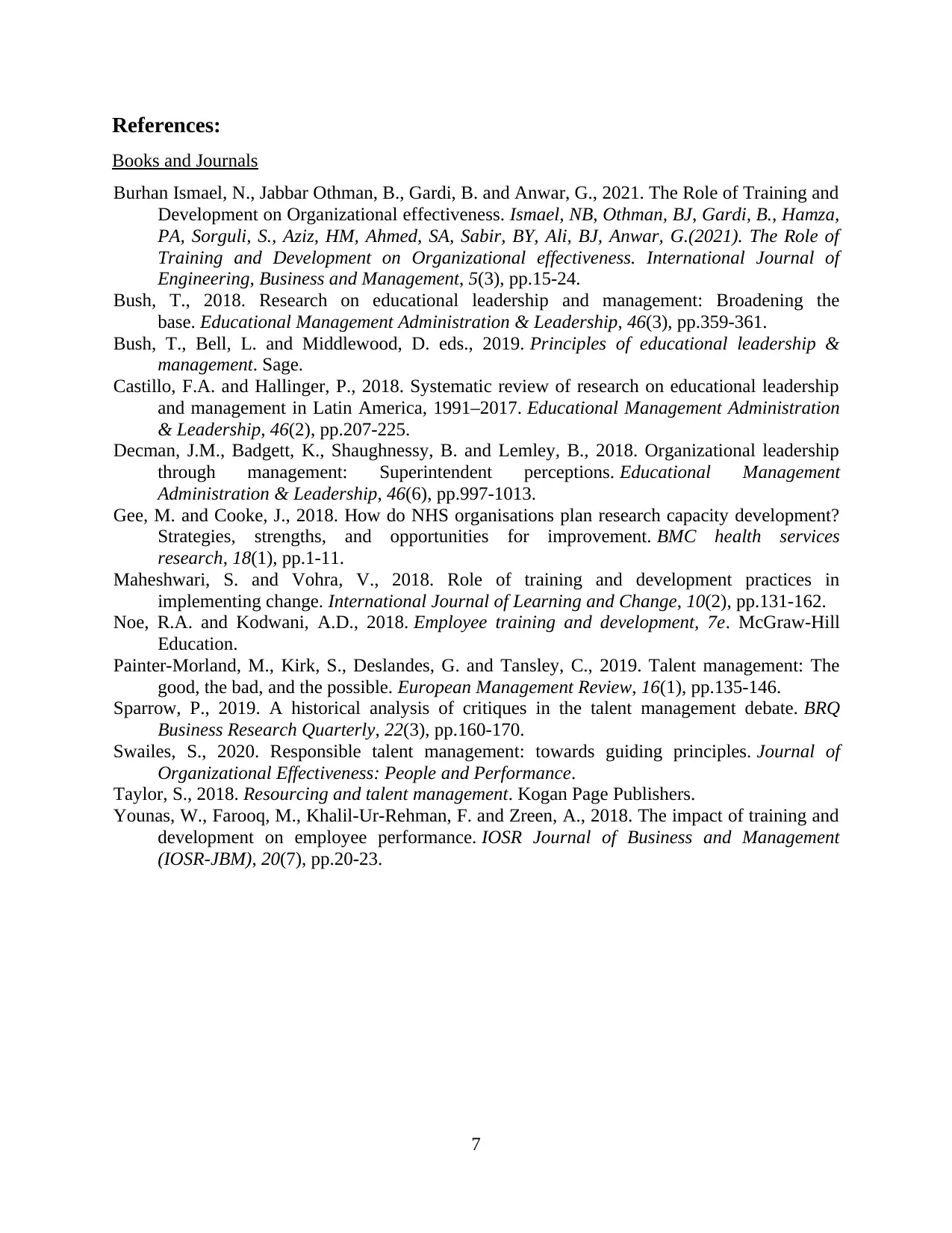
References:
Books and Journals
Burhan Ismael, N., Jabbar Othman, B., Gardi, B. and Anwar, G., 2021. The Role of Training and
Development on Organizational effectiveness. Ismael, NB, Othman, BJ, Gardi, B., Hamza,
PA, Sorguli, S., Aziz, HM, Ahmed, SA, Sabir, BY, Ali, BJ, Anwar, G.(2021). The Role of
Training and Development on Organizational effectiveness. International Journal of
Engineering, Business and Management, 5(3), pp.15-24.
Bush, T., 2018. Research on educational leadership and management: Broadening the
base. Educational Management Administration & Leadership, 46(3), pp.359-361.
Bush, T., Bell, L. and Middlewood, D. eds., 2019. Principles of educational leadership &
management. Sage.
Castillo, F.A. and Hallinger, P., 2018. Systematic review of research on educational leadership
and management in Latin America, 1991–2017. Educational Management Administration
& Leadership, 46(2), pp.207-225.
Decman, J.M., Badgett, K., Shaughnessy, B. and Lemley, B., 2018. Organizational leadership
through management: Superintendent perceptions. Educational Management
Administration & Leadership, 46(6), pp.997-1013.
Gee, M. and Cooke, J., 2018. How do NHS organisations plan research capacity development?
Strategies, strengths, and opportunities for improvement. BMC health services
research, 18(1), pp.1-11.
Maheshwari, S. and Vohra, V., 2018. Role of training and development practices in
implementing change. International Journal of Learning and Change, 10(2), pp.131-162.
Noe, R.A. and Kodwani, A.D., 2018. Employee training and development, 7e. McGraw-Hill
Education.
Painter‐Morland, M., Kirk, S., Deslandes, G. and Tansley, C., 2019. Talent management: The
good, the bad, and the possible. European Management Review, 16(1), pp.135-146.
Sparrow, P., 2019. A historical analysis of critiques in the talent management debate. BRQ
Business Research Quarterly, 22(3), pp.160-170.
Swailes, S., 2020. Responsible talent management: towards guiding principles. Journal of
Organizational Effectiveness: People and Performance.
Taylor, S., 2018. Resourcing and talent management. Kogan Page Publishers.
Younas, W., Farooq, M., Khalil-Ur-Rehman, F. and Zreen, A., 2018. The impact of training and
development on employee performance. IOSR Journal of Business and Management
(IOSR-JBM), 20(7), pp.20-23.
7
Books and Journals
Burhan Ismael, N., Jabbar Othman, B., Gardi, B. and Anwar, G., 2021. The Role of Training and
Development on Organizational effectiveness. Ismael, NB, Othman, BJ, Gardi, B., Hamza,
PA, Sorguli, S., Aziz, HM, Ahmed, SA, Sabir, BY, Ali, BJ, Anwar, G.(2021). The Role of
Training and Development on Organizational effectiveness. International Journal of
Engineering, Business and Management, 5(3), pp.15-24.
Bush, T., 2018. Research on educational leadership and management: Broadening the
base. Educational Management Administration & Leadership, 46(3), pp.359-361.
Bush, T., Bell, L. and Middlewood, D. eds., 2019. Principles of educational leadership &
management. Sage.
Castillo, F.A. and Hallinger, P., 2018. Systematic review of research on educational leadership
and management in Latin America, 1991–2017. Educational Management Administration
& Leadership, 46(2), pp.207-225.
Decman, J.M., Badgett, K., Shaughnessy, B. and Lemley, B., 2018. Organizational leadership
through management: Superintendent perceptions. Educational Management
Administration & Leadership, 46(6), pp.997-1013.
Gee, M. and Cooke, J., 2018. How do NHS organisations plan research capacity development?
Strategies, strengths, and opportunities for improvement. BMC health services
research, 18(1), pp.1-11.
Maheshwari, S. and Vohra, V., 2018. Role of training and development practices in
implementing change. International Journal of Learning and Change, 10(2), pp.131-162.
Noe, R.A. and Kodwani, A.D., 2018. Employee training and development, 7e. McGraw-Hill
Education.
Painter‐Morland, M., Kirk, S., Deslandes, G. and Tansley, C., 2019. Talent management: The
good, the bad, and the possible. European Management Review, 16(1), pp.135-146.
Sparrow, P., 2019. A historical analysis of critiques in the talent management debate. BRQ
Business Research Quarterly, 22(3), pp.160-170.
Swailes, S., 2020. Responsible talent management: towards guiding principles. Journal of
Organizational Effectiveness: People and Performance.
Taylor, S., 2018. Resourcing and talent management. Kogan Page Publishers.
Younas, W., Farooq, M., Khalil-Ur-Rehman, F. and Zreen, A., 2018. The impact of training and
development on employee performance. IOSR Journal of Business and Management
(IOSR-JBM), 20(7), pp.20-23.
7
⊘ This is a preview!⊘
Do you want full access?
Subscribe today to unlock all pages.

Trusted by 1+ million students worldwide
1 out of 9
Related Documents
Your All-in-One AI-Powered Toolkit for Academic Success.
+13062052269
info@desklib.com
Available 24*7 on WhatsApp / Email
![[object Object]](/_next/static/media/star-bottom.7253800d.svg)
Unlock your academic potential
Copyright © 2020–2026 A2Z Services. All Rights Reserved. Developed and managed by ZUCOL.




